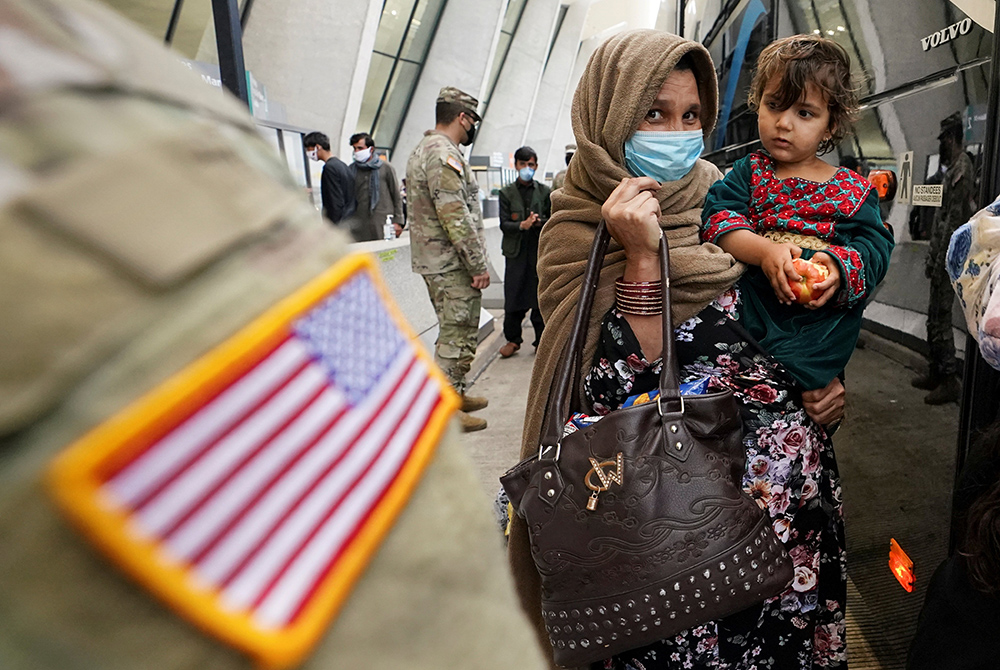
Upon their arrival, Afghan refugees board a bus at Dulles International Airport Sept. 1 in Dulles, Virginia, taking them to a processing center. (CNS/Reuters/Kevin Lamarque)
Last weekend found me on Zoom again for my community's October meetings. On Saturday, we spent the day reflecting on our "Litany of Hope and Promise." In the months prior to the meetings, we were asked to commit ourselves to an individual action. Today, we would begin to discern a way forward.
We began our time together in small group conversation, sharing about our own commitments. Around my breakout room, I heard sisters and associates talk about how hard it was to choose a single commitment. We asked: Am I committing myself to eradicate racism in all its forms? To contemplative prayer? To awakening new life in the church? To cherishing one another?
One sister observed that each of the commitments flowed from the Gospel message and our own mission statement. Another sister reflected, "We are constantly being called to everything on this list ... the call is different today and tomorrow. But the constant is that we are called to be faithful to the call of the prophets."
As each person spoke, my mind drifted to a phone call I received at 8 p.m. the night before. "We need housing for Afghani refugees. Who do you know?"
I'll be honest. This was the last call I expected to receive on a Friday night. After a week of midterms and countless meetings, I was ready for an evening off before spending the weekend on Zoom. But housing was needed now. It was not a need that could be postponed for another week or month. I sent texts and a Facebook post to friends in the local area and promised to ask around at the community meetings.
In my small group, I shared about this urgent need for housing and how it shifted my own sharing about a well-planned commitment to eradicate racism in all its forms. Yes, I will continue to work towards the eradication of systemic racism, I said, but the immediate need today was housing for Afghani refugees. Everyone understood the need, but a frequent question was, "How?" I did not have a clear response for "how," but said that we needed to take a risk and respond in whatever way we could.
At liturgy later that day, the opening hymn was "Find Us Ready" by Tom Booth. The congregation sang:
Find us ready, Lord, not standing still.
Find us working and loving and doing your will.
Find us ready, Lord, faithful in love,
building the kingdom that's here and above,
building the kingdom of mercy and love.
These lyrics invited me into deeper reflection on the morning's community meeting and my own awareness and response to the ever-changing needs around me. Am I faithful in responding to the needs in the best way that I can? Am I willing to shift my focus when something arises that needs my immediate attention? Am I faithful to my own relationship with God and freely responding to the calls of the prophets around me?
Advertisement
Using the lyrics from Tom Booth's song as a guide, I wonder if we are truly finding ourselves ready. But I know that our faithfulness to the Gospel finds us ready to respond to the call of the prophets, to activate and use our resources for change, to respond to urgent needs, and to listen to the voices around us. It is our faithfulness to the people around us that calls us to action and an awareness of our own response that pulls us out of our comfort zones and disrupts our routines. The "needs of the times" do not wait for us to plan a response. They demand us to respond with the same sense of urgency that they call out to us. This forces us to let go of control and our own desires to respond in perfectly discerned ways.
Faithfulness to the call finds us ready (and already): responding to the needs of the times, centering ourselves in the Gospel message, eradicating systemic racism in the places that are closest to us, living into any challenge ahead filled with hope and joy, speaking truth to power, forging ahead amidst changing demographics, creating homes at the border and amidst makeshift camps, and sharing love with all we encounter.
If we are to dedicate ourselves to responding to the needs of the times, we have to be ready for the late-night phone calls that shift our commitments, for difficult conversations that force us to reevaluate our own status quo, and be willing to act now and immediately respond to the people and events before us.







